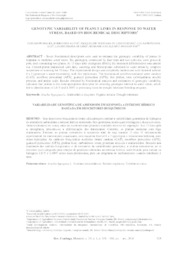Genotypic variability of peanut lines in response to water stress, based on biochemical descriptors.
Genotypic variability of peanut lines in response to water stress, based on biochemical descriptors.
Author(s): ALVES, G. M. R.; PEREIRA, J. W. de L.; LUZ, L. N. da; LIMA, L. M. de; SANTOS, R. C. dos
Summary: Seven biochemical descriptors were used to estimate the genotypic variability of peanut in response to moderate water stress. Six genotypes, constituted by four lines and two cultivars, were grown in pots, each containing two plants. At 15 days after emergence (DAE), the treatment differentiation was carried out: Control-plants maintained with daily watering, and Stress-plants submitted to water stress by complete suspension of watering for 15 days. The experimental design was completely randomized with factorial scheme 6 x 2 (genotype x water treatments), with five replications. The biochemical variables evaluated were: catalase (CAT), ascorbate peroxidase (APX), guaiacol peroxidase (GPX), free proline, total carbohydrates, soluble proteins, and amino acids. Results obtained by biochemical analysis and estimation of genotypic variability indicated that proline is the most appropriate descriptor for selecting genotypes tolerant to water stress, which led to identification of L81V and L108V as promising lines for drought tolerance breeding program.
Publication year: 2016
Types of publication: Journal article
Unit: Embrapa Cotton
Keywords: Amendoim, Arachis hypogaea, Enzima antioxidativa, Estresse hídrico, Peanuts
Observation
Some of Embrapa's publications are published as ePub files. To read them, use or download one of the following free software options to your computer or mobile device. Android: Google Play Books; IOS: iBooks; Windows and Linux: Calibre.
Access other publications
Access the Agricultural Research Database (BDPA) to consult Embrapa's full library collection and records.
Visit Embrapa Bookstore to purchase books and other publications sold by Embrapa.

